This article is the first in a series about the fall of Artsakh, its humanitarian consequences and relief efforts, based on Lillian Avedian’s on-the-ground reporting from Armenia in October 2023.
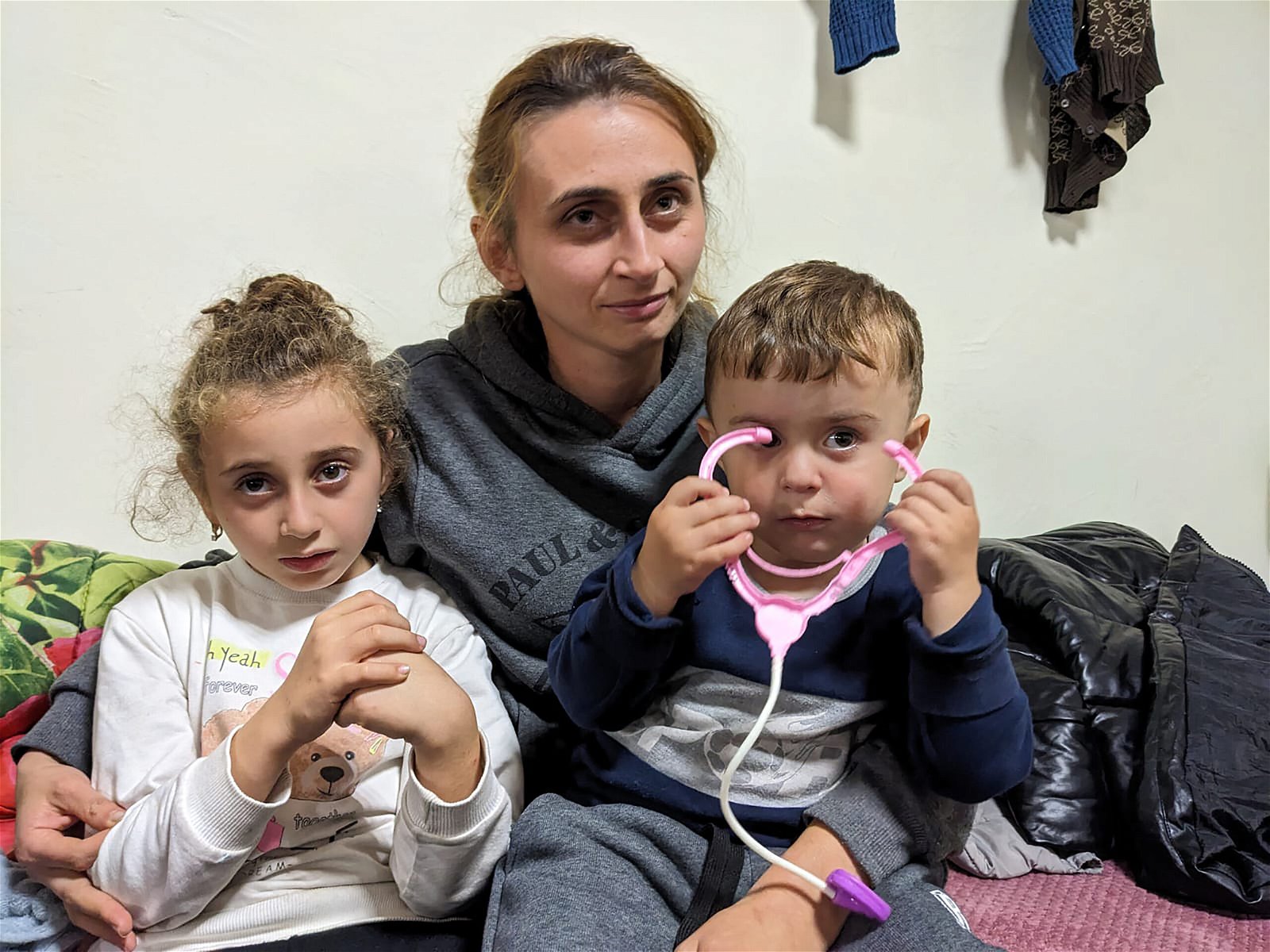
On Mike’s first day of preschool, Azerbaijani soldiers attacked his village in Artsakh.
Mike was born just after the end of the 44-day war in Artsakh in the fall of 2020. His parents did not know if they should celebrate his arrival as a miracle in the aftermath of war or grieve the birth of their first son, who one day might join the thousands of Armenian soldiers killed that autumn.
On September 19, 2023, Mike and his classmates were woken up from their afternoon nap time by Azerbaijani shelling near Berdashen village in the Martuni district of Artsakh. The teachers did not have time to change the children out of their pajamas before rushing them to a bunker. Mike’s mom Sirun, a 37-year-old history teacher at the local school, was escorting her students to a bunker. Yet her own children consumed her fear. Twice she started to run to the preschool building, but the principal stopped her.
When the shelling started, Sirun’s mother-in-law, 76-year-old Svetlana, stuck her head out of the window of their home and screamed her grandchildren’s names between sobs. Her son beseeched her to go to a bunker, but she refused. She walked around the village for three hours searching for her grandkids. The bombardment was in closer proximity to Berdashen than any attacks the family had witnessed during the 2020 war. The sound of the first shell knocked one of Svetlana’s grandchildren off her feet.
I met the family in Armenia three weeks after the attack. Mike and his two sisters had just started to talk again, after the shelling had stunned them into weeks of silence. “Everyone was surprised I named him Mike,” Sirun told me. “They said I should have given him an Armenian name like Tigran, one of our Armenian kings. Maybe my heart knew I would go abroad, leave Artsakh for another country.”
On September 19, Azerbaijan launched a full-scale military offensive on Artsakh, or Nagorno-Karabakh. The Artsakh Defense Army, which did not have the military support of Armenia, was outgunned and outnumbered by the Azerbaijani forces. After 24 hours of intense fighting and shelling, which caused widespread destruction to civilian homes and settlements, the de facto Armenian authorities of Artsakh signed a Russian-brokered ceasefire agreement with Azerbaijan, under which they agreed to disband and disarm the Artsakh Defense Army. A week later, they announced the dissolution of all state institutions, which had governed Artsakh since Armenia’s victory in the first Artsakh War in the 1990s, by January 1, 2024. At least 200 Artsakh soldiers and two dozen civilians were killed in the offensive.
The attack came after a near 10-month blockade imposed on Artsakh by Azerbaijan, which created severe shortages of food, medicine, hygiene products and other basic necessities and precipitated a humanitarian crisis for the region’s Armenian population. In the days following Artsakh’s surrender, over 100,000 Armenians fled from Artsakh to seek refuge in Armenia. Only a few dozen Armenians remain in Artsakh, according to Artsakh officials. During his visit to an emptied Stepanakert, Artsakh’s capital, on October 15, Azerbaijani President Ilham Aliyev said that Azerbaijan “got our lands back, restored our territorial integrity and at the same time restored our dignity.”
“Their goal was ethnic cleansing. Just like Talaat Pasha said from the beginning, we will leave behind one Armenian, and only in a museum,” Sirun said, referring to the Ottoman leader and one of the architects of the Armenian Genocide that started in 1915.
Sirun thinks of the Azerbaijani attack differently. She calls it ethnic cleansing.
“Their goal was ethnic cleansing. Just like Talaat Pasha said from the beginning, we will leave behind one Armenian, and only in a museum,” Sirun said, referring to the Ottoman leader and one of the architects of the Armenian Genocide that started in 1915. Sirun is eloquent and well-read. She oscillates between rage over the failure of the international community and Armenian leadership to protect Artsakh and detached political analysis.
Berdashen is one of many Artsakh villages that was encircled by Azerbaijani soldiers from September 19-24, making it impossible to evacuate their local populations. The villages were completely cut off from access to electricity, food and medicine, leaving their residents in the dark, both literally and figuratively, as they could not communicate with other villages and towns in Artsakh or receive information from the authorities. For four nights, Sirun’s family sat indoors with the lights shut off.
The residents of towns and villages outside of the capital that were not blockaded by Azerbaijani soldiers were evacuated to the base of the Russian peacekeeping mission in Artsakh, which operated out of the Stepanakert airport. There was little food or water at the airport. The Russian peacekeepers offered some bread that had been delivered from Azerbaijan, yet many people refused to eat it. “They kill our children, and then we eat their bread?” one woman told me. “It’s better to go hungry than eat their flour. Didn’t we endure for nine months?”
She’s the 36-year-old mother of teenagers Babken and Ani. She and her family spent four days at the airport. They slept in their car at night, because the airport was so crowded, there was no room to lie down. “You couldn’t breathe. I was suffocating,” she said.
Two of her nephews died in the September 19 attack. 19-year-old Arsen was killed in the shelling. The doctors amputated both of his legs, yet two hours later he died in the hospital. Arsen’s cousin, who got married two months ago, was also killed. “He was a beautiful boy,” she said, showing me a picture of Arsen in a soldier’s uniform on Facebook. His face was youthful but stern.
“If a dog had been in our place, it would have died. It was unbearable,” another woman told me, who stayed at the airport for two days with her kids, Sashka and Agnessa. They wailed the whole time along with the other children. They are still frightened by loud noises, reminiscent of bombs.
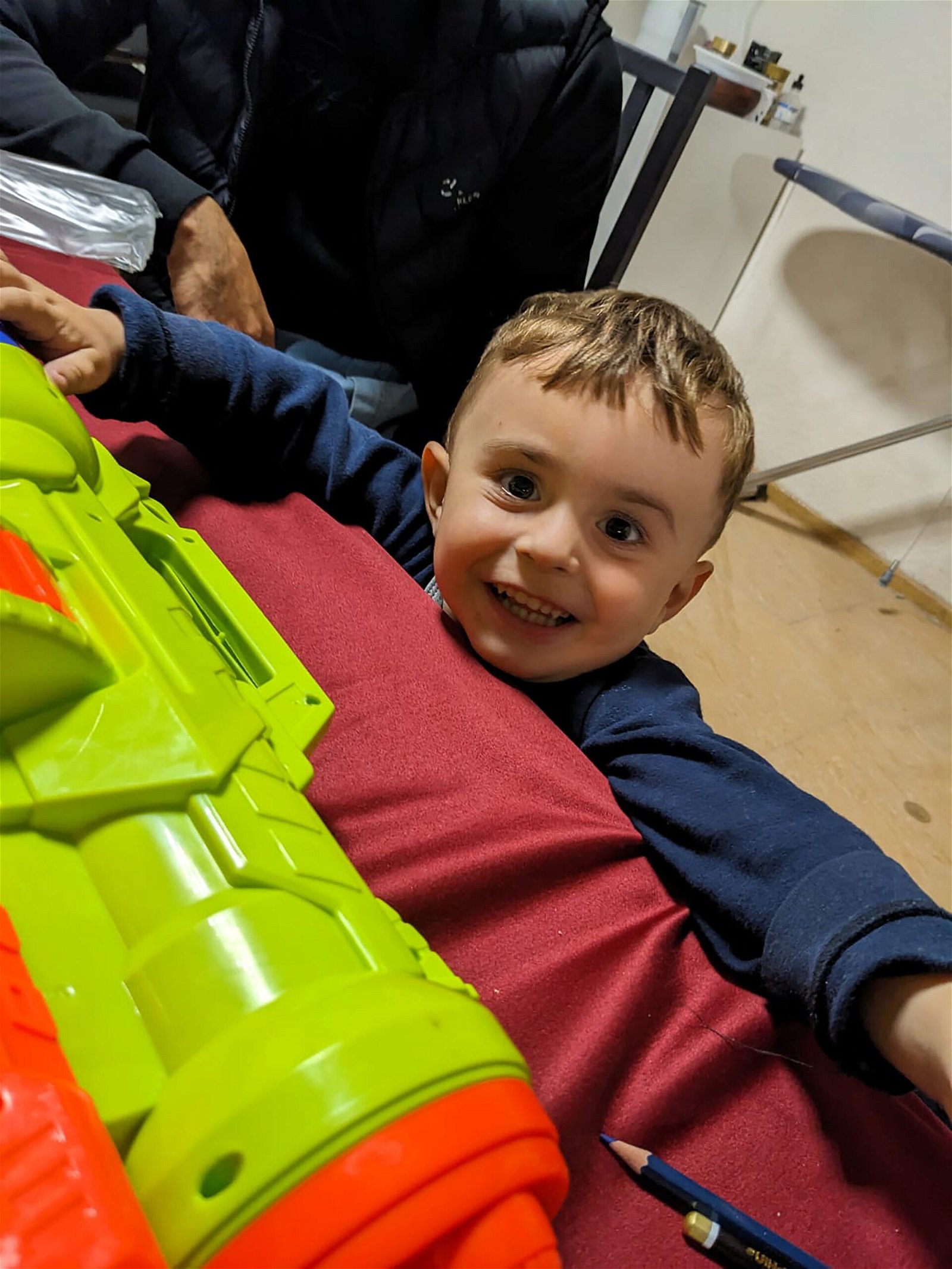
In Stepanakert, residents watched the influx of people into the city and waited. 62-year-old Susanna made cheese from some milk on an outdoor wood stove to distribute to kids in the bunkers. Her niece Mariam, who is 26, walked through the streets beneath the shelling to find her neighbors’ kids and take them to safety. Mariam has already lived through three wars in her young life. Two of her classmates and one of her cousins died serving in the 44-day war in 2020. She talks about war calmly, as if it is an unremarkable topic of conversation. “We’re used to bombings. We’ve adapted to everything,” Susanna said.
A year after Mariam’s cousin was killed in the 2020 war, her family removed his body from his grave in Artsakh and transported it to Yerablur, the military cemetery in Yerevan, Armenia. His mom worried that Azerbaijani forces could destroy his grave in case of the outbreak of a new war.
Susanna related her family’s losses without agitation, yet when she spoke about abandoning her mother’s gravestone in Artsakh, she wept. Her mom passed away two years ago. During the 44-day war, Susanna took her mother, who at the time was aging and ailing, to Armenia. “When we returned to Artsakh, my mom said to me, Susanna, please don’t leave me alone. I responded, what are you talking about? Now, I’ve realized this is what she was talking about,” Susanna said.
“There was hope at the time that we would return,” Susanna added, referring to the 44-day war.
“We’ll go back one day. There’s hope,” Mariam assured.
“We’ll go back,” Mariam’s mom Mary repeated, mocking and incredulous.
“God willing. Our houses, our graves. I don’t think about the homes as much as the graves,” Susanna said. “They’ll destroy them. They’ll flatten the graves.”
Since the fall of Artsakh, experts have warned that Azerbaijan will likely destroy Armenian cultural heritage in Artsakh, in efforts to eliminate evidence of ancient Armenian presence and sever Armenians’ connection to the land. In Nakhichevan, Azerbaijan’s exclave, Azerbaijan engaged in systemic destruction of the region’s Armenian cultural heritage over the past three decades, demolishing 90 medieval churches, 5,840 cross-stones and 22,000 tombstones.
Sirun never envisioned that her family would leave Artsakh. Even in the days following Azerbaijan’s attack, when they “weren’t alive,” in Sirun’s words, they baked lavash bread for the coming weeks. During the near 10-month blockade, they had stored vegetable preserves in preparation for the winter. “Berdashen is a beautiful village. Our village’s story dates back to the seventh century. We have a statue that is like Mother Armenia, holding a branch that symbolizes freedom and independence,” she said with pride tinged with longing.
On September 24, the mayor of Berdashen announced that the road to Stepanakert would open that morning. He issued an order for all residents to evacuate, since Azerbaijani soldiers would soon advance on the village. Sirun’s family stayed with relatives in Stepanakert for a few days before departing for Armenia.
The authorities of Artsakh and Armenia organized the mass evacuation of Artsakh’s population. Artsakh’s president Samvel Shahramanyan visited the Stepanakert airport and announced that five buses had arrived to transport people to Armenia. He gave the option for people to remain in Artsakh, yet nobody wanted to stay.
All of the Armenians from Artsakh I met were unanimous: it would be impossible to live under Azerbaijani rule without fearing for their lives.
Sirun said that if Azerbaijan had agreed to international guarantees of the rights and security of the Armenians of Artsakh, including the right to practice their language, culture and identity, she would have stayed. During negotiations on the status of Artsakh, Armenia had repeatedly called for such international guarantees, yet Azerbaijan had refused adamantly, insisting that the governance of Artsakh was a domestic matter. “If the 44-day war hadn’t taken place, if we hadn’t had so many losses, it would have been possible to live like we did in the Soviet era as neighbors. But after so many losses and hostility, it’s not possible,” Sirun said.
“After all of these deaths, after being tortured these nine months, how could we have stayed?” Mary told me. “How could I have kept my three sons there?”
“If we thought they would treat us normally, we would have stayed. No one wants to leave their home. But when you know how they’ll treat you, you don’t want to stay,” Ani and Babken’s mom said.
Offered the choice between living under a regime that had terrorized them for months, refused to offer guarantees for their rights and security, and destroyed hundreds of lives and homes in a 24-hour blitz, or leaving their homes, the Armenians of Artsakh did not see a real choice. Over the course of a week, over 100,000 Armenians packed into cars and government buses and drove to Goris, a border town in southern Armenia, in an unbearable traffic jam. A drive that under normal conditions takes a few hours lasted more than two days, and Ani and Babken’s mom said that it “felt like years.”
She and her family barely had room to stand on the packed government bus. Her 63-year-old mom climbed up a hill on the side of the road to pick apples to distribute to those on board the bus, the only food they ate for over two days. One child kept coughing, but there was no water to offer him.
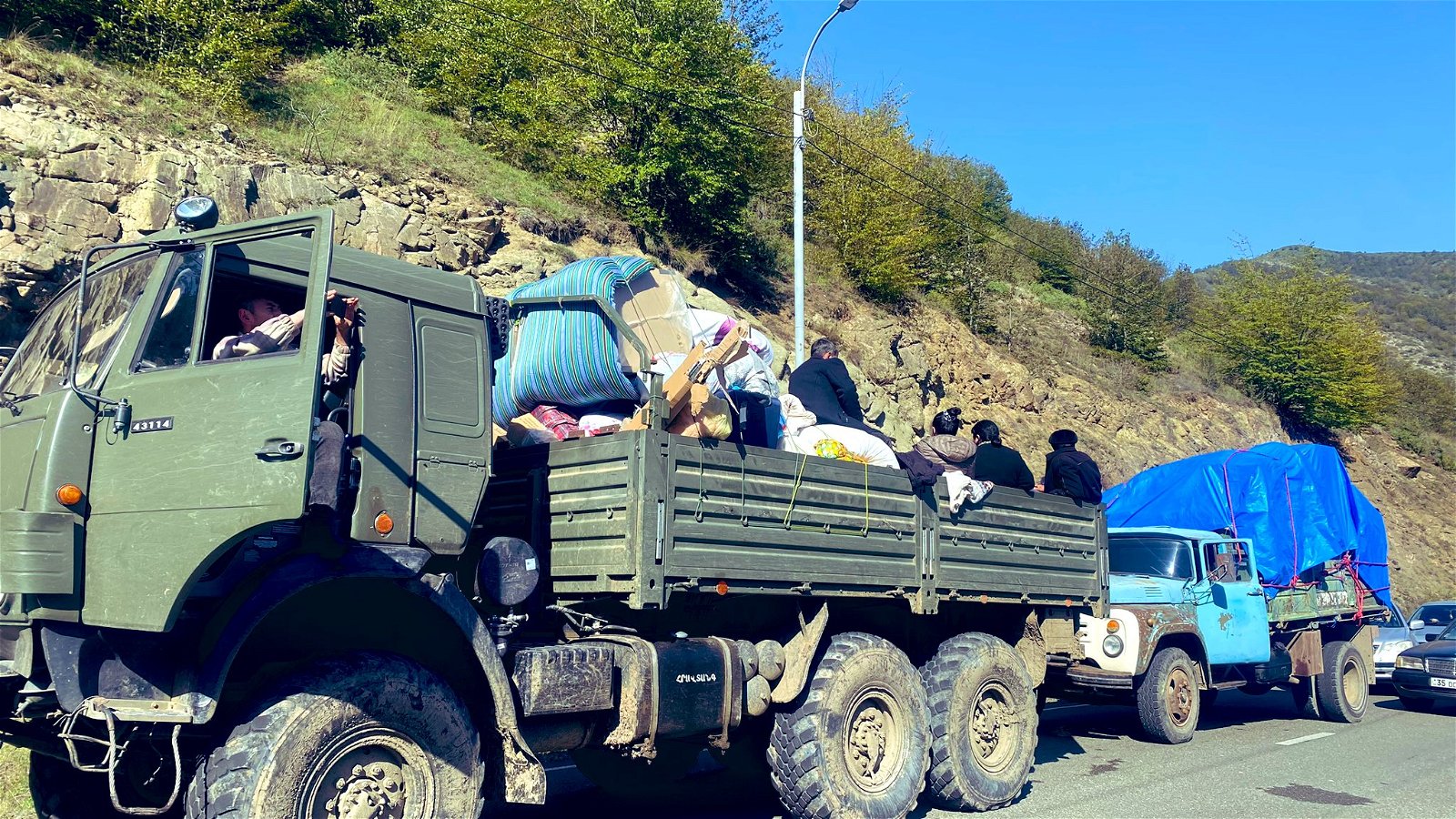
The mass evacuation was made more chaotic and tragic by the sudden explosion and fire at a fuel depot in Stepanakert on September 25. Hundreds of cars had been lined up at the depot to get fuel for the long drive to Armenia. At least 200 people were killed in the blast. Seven people from Sirun’s village Berdashen died, including her neighbor Gegham, who left behind two children; her 15-year-old student Vahe; and 19-year-old Marat, who had returned unharmed from his military service. “Marat was a polite, handsome kid,” Sirun sighed.
The Artsakh hospital, which already had limited resources and medical supplies due to the blockade, was operating beyond its capacity to treat victims of the attack. 120 patients were transported to the national burn center in Yerevan by helicopter. The hospital, which only had space for 40 patients, had to dramatically increase its capacity overnight, including by moving hospital beds into offices. Patients had third- and fourth-degree burns that caused severe internal damage, including lung and heart complications. Sahak Hakobyan, Deputy Director General of the National Center of Dermatology of Armenia, described those first few days as “hell.”
“The patients are not at zero illness. They are at negative illness, because they’ve lived under blockade for nine months and haven’t eaten or slept properly. We’re bringing them to zero then treating them,” Hakobyan said.
About a dozen patients have been transferred to Belgium, Bulgaria, France and Spain for plastic surgery and rehabilitation. 83 people are still being treated at the Yerevan burn center. One boy, whose father has been hospitalized with a burn injury, sits in the hospital waiting room all day. “I don’t have anything in my life. I only have this backpack filled with some clothes and my dad,” he told Hakobyan.
Every Armenian leaving Artsakh was stopped at the Azerbaijani border checkpoint, set up during the blockade to tighten Azerbaijan’s control of any movement in and out of Artsakh. In the past, Azerbaijan has used the checkpoint to prohibit the entry of humanitarian aid into Artsakh and conduct arbitrary arrests of Armenians at the border.
Armenians from Artsakh reported being harassed and intimidated by Azerbaijani border guards during their mass exodus. When Susanna’s family was stopped at the checkpoint, Azerbaijani soldiers carrying guns said to her, “We’re going to capture Yerevan next. Why are you leaving? Your life will be better here. Stay and be integrated [into Azerbaijan].” Azerbaijani soldiers forced Sirun’s husband to get out of the car. They demanded that he repeat after them in Russian: “This is Azerbaijan. Azerbaijan is a strong country.”
People have also reported that Azerbaijani border guards stole their jewelry and valuable belongings to keep or discard. Sirun saw photos of Jesus and the Virgin Mary strewn across the side of the road. Someone in a car ahead of hers shouted at her to hide the cross hanging on her dashboard. She removed the cross and hid it until they reached the other side of the checkpoint. “We have to carry our cross. Everyone carries their cross, their pain, and their lived experiences,” Sirun said.
In Armenia, the displaced families from Artsakh are facing a severe housing crisis. Those with families in Armenia are staying in tight quarters in their relatives’ homes. The Armenian government has said that it has provided housing for about 68,000 people in abandoned buildings, hotels and houses. Yet many people remain in temporary shelters provided by nonprofit organizations, hastily converted from empty schools, offices and other buildings.
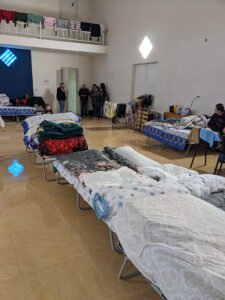
The Goris Development Foundation, a nonprofit that empowers women to find work and engage in public life, rapidly converted its office into a shelter at the start of the influx of people from Artsakh into Goris. The organization is currently assisting 28 people living at the shelter with securing permanent housing. One family stayed at the shelter for two days while arranging the burial of their grandmother, who died of poor health on the harrowing drive from Stepanakert to Goris.
“We need to address the housing issue urgently. People can eat or wear a little less, but they can only live under these conditions for so long. We need to solve the housing problem as quickly as possible,” said Ruzanna Torozyan, executive director of the Goris Development Fund.
Torozyan says that, despite its public statements, the Armenian government has not been proactive in securing housing for displaced people from Artsakh. With varying levels of efficiency and will, each municipality in Armenia has identified empty buildings in their districts to convert into housing. Torozyan said she has applied to the government several times over the past three years for funding to house people who were displaced during the 44-day war, yet the funding has never been granted.
Agnessa and Sashka’s family has been staying at the Goris Development Fund building. The office has turned a large room, reminiscent of a gym or a banquet hall, into a shelter, lining the walls with beds. Laundry hangs on the second floor railing to dry. Their grandmother, 74-year-old Roza, sits on her bed all day and agonizes over everything her family has lost.
“We had orchards, cows, lambs, chickens. We never had a need for money. We never asked anyone for anything. The Azeris didn’t let us live,” Roza lamented, her voice trembling.
For infant Sashka, the shelter, with all of its empty space for running around, is a playground. His shrieks and laughter echoed off of the high walls as he sprinted around. “Sashka! My head hurts,” his grandmother complained. “He yells all day,” she said, and her social worker laughed.
Agnessa tapped my arm to show me her painting of a road. Unlike the traffic-ridden Stepanakert-Goris journey she and her family had recently undertaken, the road was empty, bordered by pastel green grass, pink flowers and a blue sky.
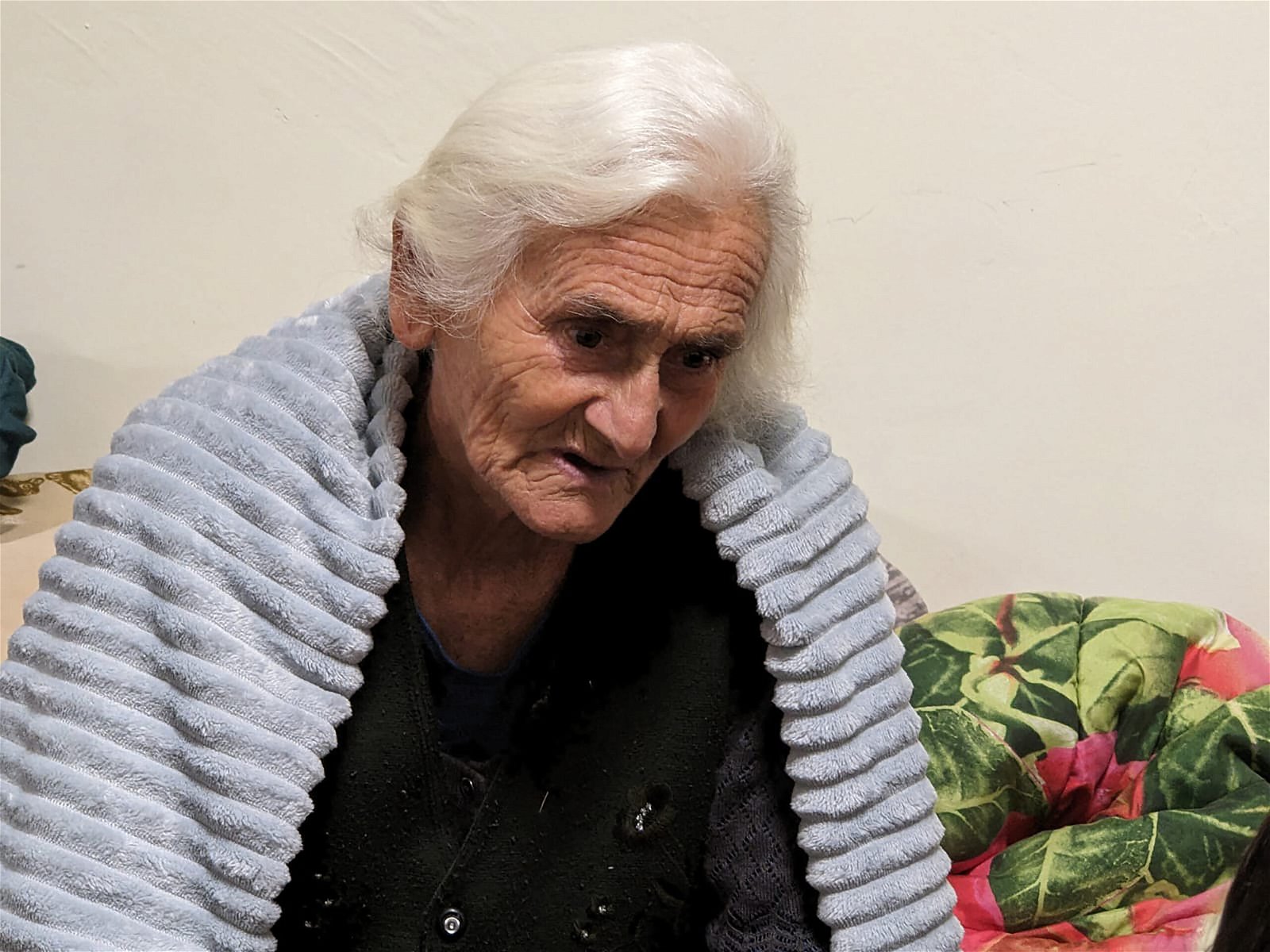
Following the arrival of the Armenians from Artsakh, Armenian landlords have doubled or tripled housing prices. Torozyan says that a house that used to cost 40,000 drams a month to rent, about $100 USD, now costs up to 90,000 drams, almost $225 USD. Sirun’s family is renting a house along with her mother’s family and grandparents–a total of 12 people–for 350,000 drams a month, about $871 USD, in Harich village. When they arrived in Armenia, she, her husband and three children spent three nights sleeping in their car. Even though the house was beyond their budget, she urged her husband to take it so that the kids would have a place to shower and rest. They don’t have any furniture and have been sleeping on the floor.
For most families from Artsakh, the upheaval of displacement has followed them their entire lives, disrupting their livelihoods as soon as they restore some stability. Many Armenians from Artsakh were displaced from Azerbaijan by pogroms at the start of the first Artsakh war. Tens of thousands of people from Artsakh sought refuge in Armenia during the 44-day war. Ani and Babken’s grandmother has been displaced three times in her 63 years. She was born in the town Hadrut in Artsakh and moved to Fizuli to get married. During the first Artsakh war, she fled to her birthplace, only to be displaced to Stepanakert during the 44-day war. Now, she’s living in Armavir, Armenia with her daughter in a house of 11 people.
“What kind of life is this for the Armenian people?” she said. “We’re all dead, and there’s no one to bury us.”
“In these 30 years, we haven’t slept comfortably. There has never been peace or comfort in our souls. But we never thought there would come a day when we would leave our uncomfortable lives and leave Artsakh,” Sirun said.



Armenians chose a homeless looking cuckold over Armenia and Artsakh
Good job chaps!
Artsakh was doomed when Pashinyan announced that it was a part of Azerbaijan and declared that the Armenian Army would not for it.
If Armenians refuse to die for Arsakh, why the heck should anybody else?
Pasinyan is a traitor and yet he is still in power – why?
Now Armenia is full of WEstern entranced Armenians who believe that they can make Geography disappear.
More fools them!
One look at a map is enough to show anyone that Armenia must, for its own sake, have Russia has its ally.
As for the future, Armenia must become a National Security state where every man receives military training and every woman is encouraged to have 4 babies so that Armenia’s population doubles in a generation. Numbers matter and Armenia’s population is ridiculously small.
Or Armenia can carry on its current path and try to pretend that Geography does not exist.
Pretty much agreed. Why not have dual citizenship? Why not have diaspora youth do mandatory 2-4 years in the Armenian Army? Many would stay after service and become Armenian Citizens. Imagine the resources and motivation of all diaspora when your kids are on the front lines?
Unfortunately the first 2 Karabakh “Presidents” were thieves and used Armenia as their personal bank and wealth account. They watched as 1/3 of the population left the country as it was so ridiculously bad and so would not even entertain such ideas. I blame them for creating the environment that ushered the current PM. However the current PM is even worse. He is highly incompetent, useless and vindictive plus stupid to boot. He is a proven loser and a danger to all Armenians.
Wow this is incredibly detailed and sad
Sad stories…but good and important to know the realities.
Excellent reporting that paints a vivid picture of the great need for humanitarian aid.
Thank you for this beautifully written and devastating report. I would love to hear more about the relief efforts that are underway and how we can support them.
Armenia is a cursed country. If you notice, there NEVER is any good news from that country.
A hard time for all those uprooted, the focus must be food and shelter for them and more permanent residency arrangements made. The next focus must be to strengthen defences to defend what’s left of Armenia.
The article was too long for a quick read, and probably did not contain any political aspects of the situation.
But I take up this occasion to say that all efforts should be concentrated and made to assure the safe repatriation of the displaced people of Artsakh under international vigilance and protection.
All the international efforts should be made in that sense, even before the solicitation of Armenia’s protection in view of Azeri threats.
The repatriation is an international right, and Azerbaijan in principle had accepted it albeit being very hypocritical about it and perhaps outright lying.
However such a move is easier to be imposed and carried out by the international community. It may not be without sacrifices and moral torture of the population, but it’s a statement of our rights over the territories and the lands, even though under azeri rule.
otherwise it would give a sign of our weakness and us abandoning quickly our lands.
That fact would encourage even more Azerbaijan to hone its appetite over Armenia proper.
And if anyone believes that the west or any western country would come to Armenia’s help he’s just a fool.
What would we do if Armenia is attacked? Leave every thing and run away?.
or decide to fight at any cost.
If we don’t fight for our rights, no one will.
Every inch of land is an immense wealth. Every inch of Artsakh was worth millions that we gave up (look at the economic downfalls on Armenia).
We have to reclaim the rights to it. And the only way to do it is Being there; Being on our lands.- Even under occupation. Let Gaza be an example.
Brothers and sisters!
What’s with all the complaints and the sadness? In the big picture, we won! We got what we wanted in 2018. Ok, we lost Qarabag but at least we are a democracy. Isn’t that more important?
Come on dear people dont, tell me you didn’t know who you were supporting back in 2018. We all knew who Nikol was back then. Remember his essays about Qarabag and Russia going back to the early 2000s? Remember his heroic role in trying to bring democracy to Armenia in 2008, hand in hand with our great statesman Levon Ter Petrosyan? We all knew who our democratic prime minister Nikol was. We all knew what our dear leader wanted. We voted for him not once but twice. Remember? So, why are you all complaining now? The honest man did what he said he will do. We empowered him to do what he said he will do. We democratically elected our great and glorious leader Nikol Pashinyan not once but TWICE for two purposes – free Armenia from the 30 year old problem called Qarabag and free Armenia from those oppressive and undemocratic Russians.
Forget that little troubled region called Qarabag. It was just a headache. Qarabag stopped Armenians from being happy with their neighbors.
Wake up, people. The real problem Armenia has is Russia. We need to make friends with Turks and unite with the civilized West and defeat aggressor Russia. That’s the formula for Armenia’s success. Anyone watching BBC and CNN to see what’s going on in the world? Russia wants to takeover the whole world and stop all people from being westernized and happy. Russia must be stopped – now. Putler (i.e. Putin+Hitler=Putler) must be stopped – now! Armenia must be liberated from Russia – now! This is the most important thing in the universe for Armenians! Don’t believe me? Ask Azgayin Bever. They work for Western, Israeli and Turkish interests, they therefore know very well what I am telling you. The real Armenia is Russia. Armenia will prosper only when we kick out every last Russian from Armenia. It’s that simple.
We got this. Let’s do it!
Our freedom loving and democratically elected leader Nikol Pashinyan started the process to free Armenia from Russian rule in 2018 with all our help, but the poor man is not done yet. So please stop the silly complaining and protests and just let our duly elected, freedom loving and enlightened Pashinyan finish his sacred work of freeing Armenia of its Qarabag problem and start valiantly fighting the Russian Bear, side by side with our freedom and democracy loving brothers and sisters in Slava Ukraine!
This is simply not the time to complain and protest. Besides, we won. Remember? We got what we wanted in 2018. We got what we wanted in 2020. We got what we wanted in 2021. Now, just relax and let our wonderful prime minister finish his work. There will be plenty of time afterwards to lament and protest Armenia’s and Qarabag’s disappearance from the world map.
Your writing is not even extremely twisted humor or satire.
It’s extreme cynical, to the pint of being out of place, which makes me doubt of you being really even slightly Armenian and wonder if you’re not azeri, turk, or an enemy agent.
If you are an Armenian, you should have a minimum of respect and know to better formulate your opinions to be taken seriously and not thrashed like you’re trying to thrash the readers.